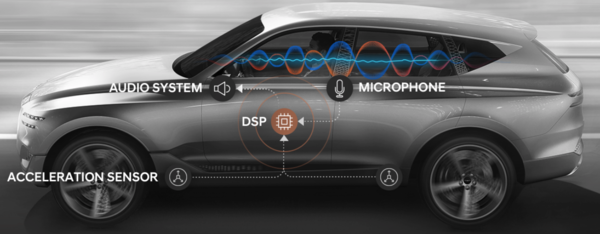A research group led by Professor Youngjin Park in the Department of Mechanical Engineering has collaborated with Hyundai Motors to create a Road Noise Active Noise Control (RANC) system that will be commercialized.
Hyundai Motors released this RANC system on November 11 as an automobile system that greatly reduces road noise for the driver. The RANC system produces an inverted sound wave that acts as a noise canceler for road noise and subsequently minimizes the internal noise level of a car. Korean and American patents for the RANC system have already been obtained.

Previous automobile noise control strategies have relied on passive control methods. For example, many automobiles possess dynamic dampers, such as insulation, sound-absorbing tiles, or mufflers, that decrease the vibrations in the engine room or under the hood. In contrast, the RANC system is an active noise control system which calculates inverting sound waves based on velocity sensors, amplifiers, microphones and a digital signal processor. Specifically, an accelerator works to recognize the road noise by measuring the vibrations between the car and the road. Extensive research was done on optimizing the location of this accelerometer as it plays a vital role in the performance of the system.
Professor Park and his research group have done extensive research on automobile noise control systems. From 1993 to 1997, their research group collaborated with Hyundai Motors on a Group of Seven (G7) national project regarding active noise control strategies. The results of this research were published and written in a Nature article titled “Noise quietens driving”, which detailed the first active noise reduction automobile system. Due to problems in commercialization from components such as digital amplifiers and digital signal processors, the technology was not commercialized. However, after 2013, Professor Park’s research team developed a RANC system based on domestic collaboration projects with various companies such as Optomech. Furthermore, Hyundai Motors collaborated with Harman International to integrate the RANC system in Genesis’ first sports SUV, GV80.
Professor Park commented that “It was very fulfilling as an engineer to be able to observe a project I have been working on for 20 years reach commercialization and work with the graduates of my laboratory in this effort.”

